'A white family raised me - I learned to love being black'
- Published
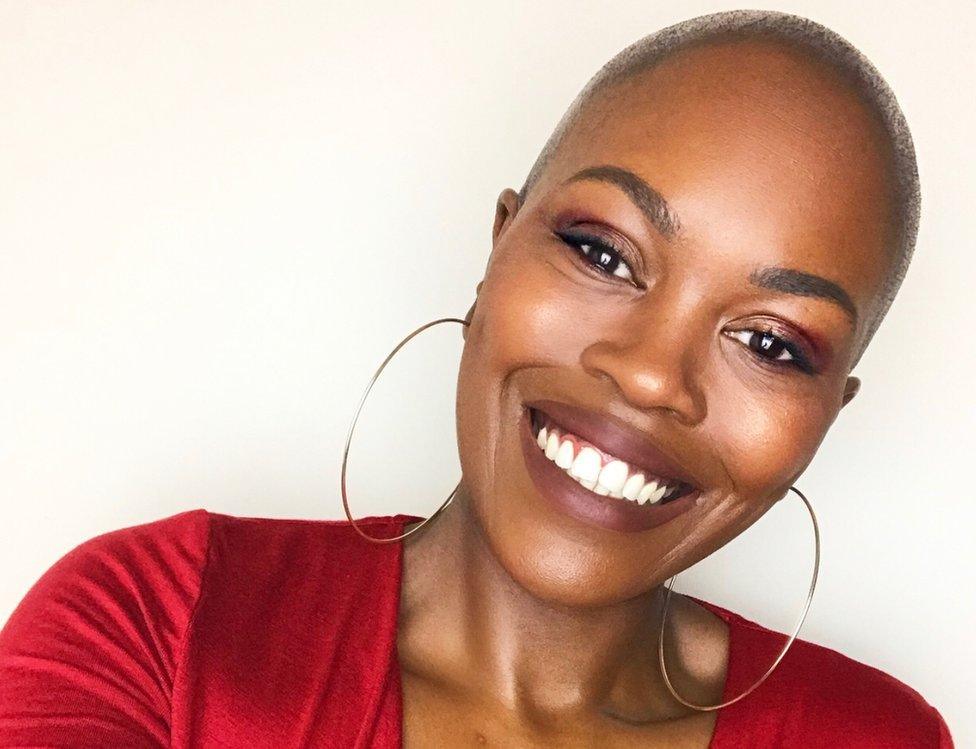
Gina Atinuke Knight's white mum loved her, but her childhood in a white family meant it took her years to embrace her blackness. Her hair was one of the first things she came to love, which is why she became a hair blogger and wig-maker.
When I was eight or nine, my family started going on caravan holidays. We went to beautiful places like Clacton-on-Sea and Whitstable, but the truth is, I found these holidays depressing. I stuck out like a sore thumb. I often felt the gaze of others, not just because I was usually the only black person in the caravan park, but because I was a little black girl walking around with my white parents.
I was born in a private clinic in London in 1983, to my biological mum, a middle-class Nigerian woman.
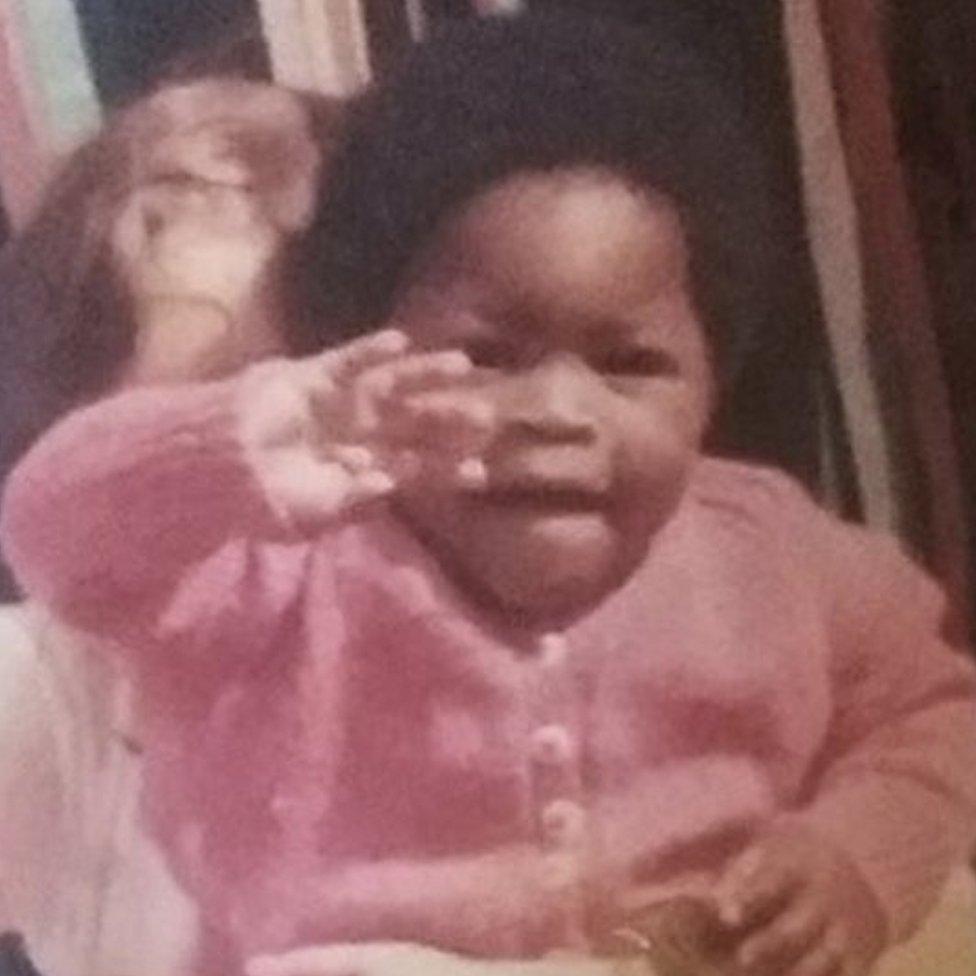
Gina Atinuke Knight as a baby
When she gave birth to me, she was 22 and unmarried. So she made the decision to leave me in the care of a white "nanny". It wasn't particularly uncommon for Nigerian parents of the 70s and 80s to leave their children in the care of white nannies in the UK while they returned to live in Nigeria. It indicated a certain status. It would convey an image that the child would be living in England, being looked after by a white nanny and learning the Queen's English. But the reality was far less glamorous.
We would live in the house with these white female carers and their families and at best, we would be treated like one of their own children. But this process known as private fostering was completely unregulated, so I've heard some horror stories.
My biological mum placed an advert in the local newspaper, looking for a nanny when I was still a baby - 11 months old, to be precise - and the next time I would see her again I was six years old.
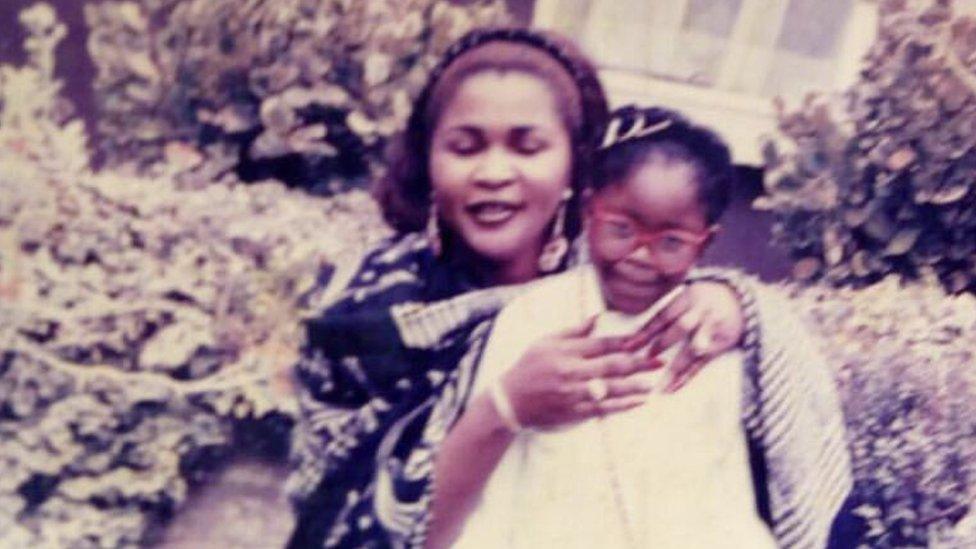
Gina Atinuke Knight with her birth mum
A couple answered the advert. They were everyday working class people from south London and they became the people who I would forever see as my parents.
So I was a black child living in South Norwood, in a predominantly black area with my white parents and their two biological children. Growing up, I was always aware our skin complexions were different, so I never had that eureka moment: "Oh, I'm black and you're white!"
Of course, classmates at primary school had questions.
"Is that your granddad?
"Is that your auntie?"
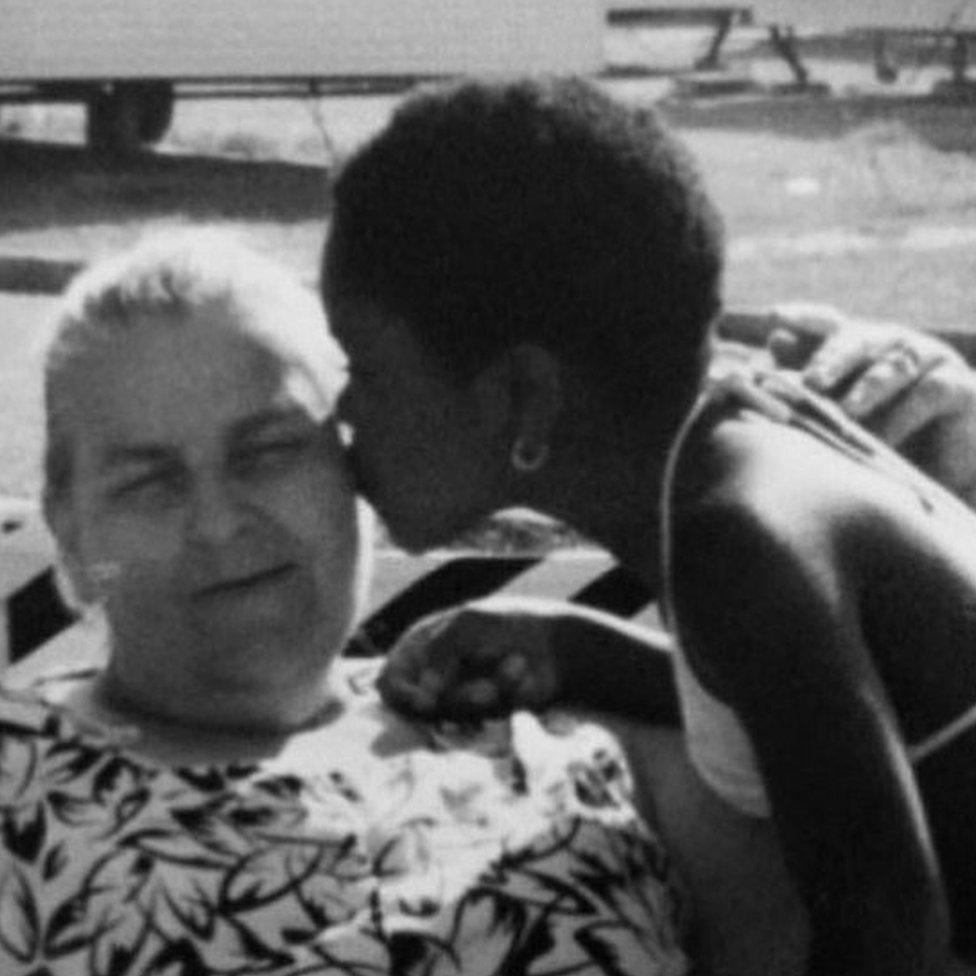
Gina Atinuke Knight and her adoptive mother
Though people asked that more because my parents were quite old, I think, and not so much because they were a different race from me.
My primary school best friend was mixed race and her mum was a dark skinned black woman. While I loved spending time with my best friend, I think I may have loved being around her mum more. My friend's mum had a job in the City and drove a pink jeep, so even at a young age, I clung to someone who was successful and resembled me.
If I was a child today, living with my parents, people would ask me if they were woke. The answer? No. As long as I was clothed, fed and looked happy, they thought they were doing a good job in terms of parenting. If I'm honest, I don't think they were able to look beyond the surface.
My mum bought me a few black dolls and tried to push me into friendships with other black girls on my street throughout my childhood, but it never really worked out because I wanted to pick my own friends.
When I think about my mum, I know she loved me. I will never forget when she marched into school after a teacher made the assumption I couldn't read. I was shy and an introvert at school, but she was furious with my teacher's unfair and untrue claim. I will never forget it because it was her way of protecting me.
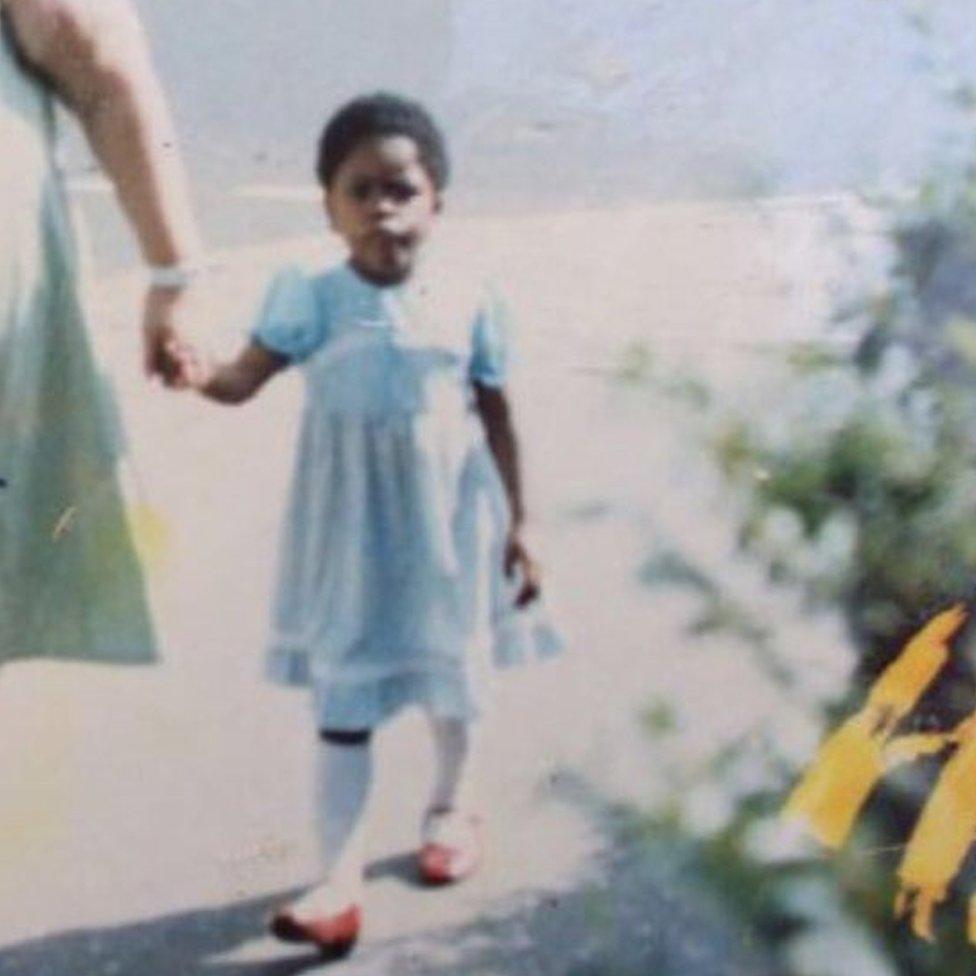
If she was still alive, I'm sure she would have been a hands-on grandmother to my daughters, and as a consequence I would still be in touch with my dad and older siblings. My dad, on the other hand, only tolerated my presence. On our caravan holidays, it would be my parents and my sister and me, as my brother was 18 years older than me. The four of us would go out for family meals and my dad would make comments like: "It would have been cheaper minus the one."
"The one" was me.
I had been in his care since I was 11 months old, and by this stage he and my mum were my legal guardians, so this was a hurtful thing to say. When my mum died, I was 21. Following her death, my dad made no effort to contact me or show that he cared.
My brother also made it clear he didn't see me as part of the family. When he was getting married, I was going to be a bridesmaid, but he refused to have me, as he didn't want me to attract attention.
I remember saying: "I don't want to be a bridesmaid anyway."
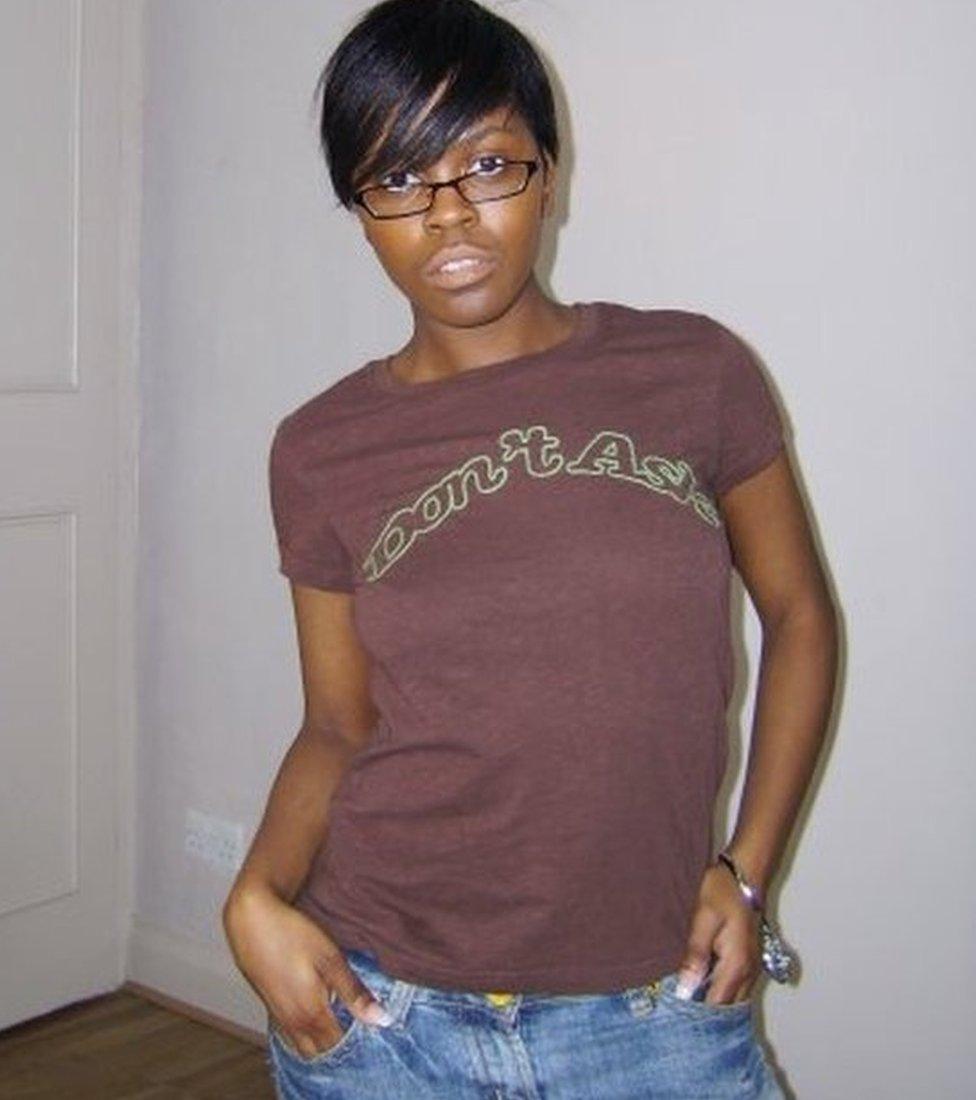
Gina Atinuke Knight in her 20s

If I could go back and choose what type of life I would live, I wouldn't choose a life where I was brought up by white parents again. I wouldn't want to go home and feel different.
It's strange because growing up where I did, the community was predominately black, so I fitted in outside my front door. I felt most alien inside my front door. I even changed my name to Gina from my birth name Atinuke. I wanted to fit in with my family at home who had traditional English names.
When my biological mother returned to London to visit, I didn't feel like I fitted in with her and that side of my family either. I remember when I was 13, my mum was staying in North London and she would have Nigerian friends round. They would speak to me in Yoruba and before I could say a word she would say: "She doesn't know how to speak Yoruba."
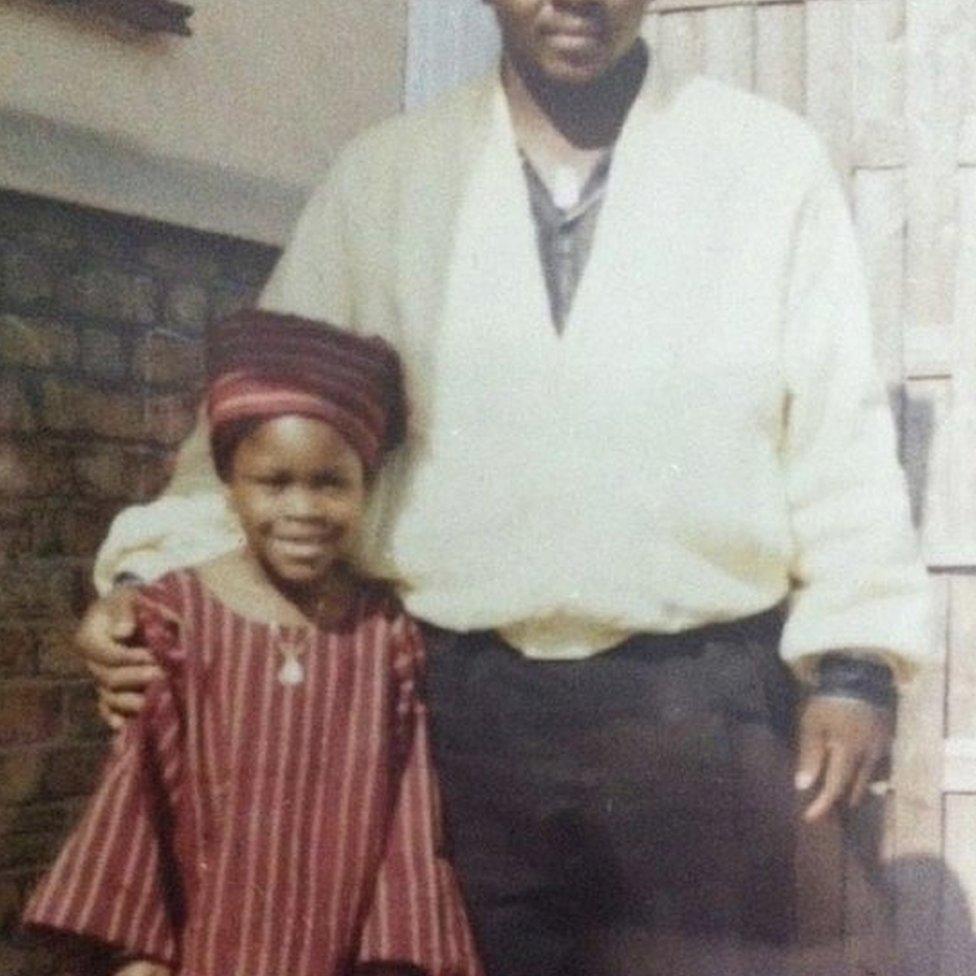
Gina with her uncle
She would answer swiftly in the hope of filling the silence when I wouldn't respond. The truth is she was embarrassed that although I was a Nigerian child, I didn't understand or have a connection to Nigerian culture. Not understanding the language of my heritage country Nigeria, my afro not being styled to her standards and not being afraid to answer her back - these were telltale signs that I was more British than Nigerian.
I didn't fit in with my Nigerian family or my white family. Looking back I was caught in a bewildering and intricate web of identity politics. That was all down to my biological mother and her belief that white people were the best people to raise me.
A turning point in figuring out who I was and embracing my blackness came in secondary school. Just like when I was a little black girl in primary school, I enjoyed being around successful older black women.
Every new academic year, my school paired us up with mentors. When I was 14, I was mentored by a black woman called June, who was a solicitor. Growing up without black female role models I felt limited in what I could achieve. I didn't see black women doing art. I didn't believe black women could be magazine editors, because I didn't know or see any. Yet, June changed my thinking. Spending time with her left me feeling 10ft tall and that I could do anything.
June was the important first step in helping me embrace who I was and who I wanted to be as a young black woman. Another was meeting my best friend in secondary school - still my best friend today - which opened me up to a different world. At her house, I was introduced to beautiful and traditional Jamaican foods such as ackee, rather than eating my mum's well-intentioned but disastrous jollof rice, made with ketchup rather than red peppers and plum tomatoes.
When we got cable, I began watching shows like The Fresh Prince of Bel-Air, which was a refreshing change from the sounds of country singer, Tammy Wynette, even though I did learn to love country music. Watching this black family on television navigate different hurdles in life from dating to racism gave me another set of role models, a different story of what it means to be a black person. Yet it wasn't only Fresh Prince and my friends that helped me embrace my blackness - I soon replaced Bunty with Black Hair magazine and I found a deep connection to my race-hair.
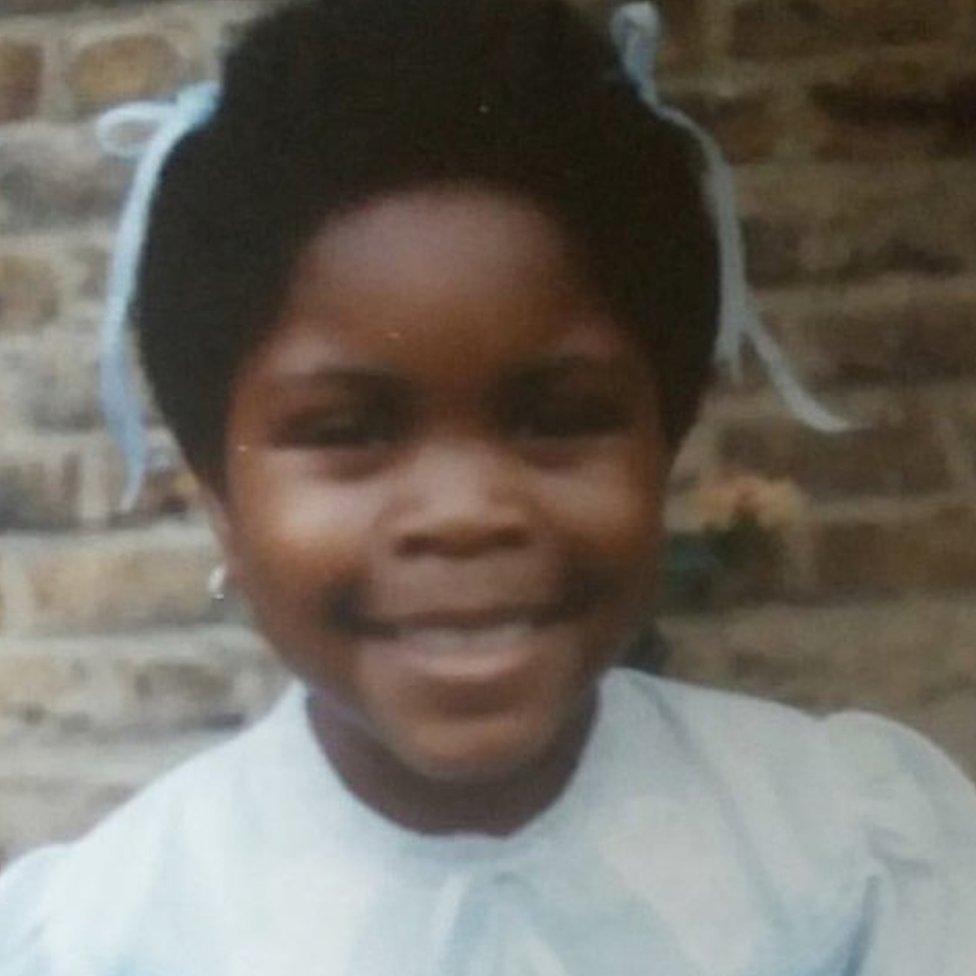
Growing up, my family had struggled with my afro. My sister, attempted to put it in two big chunky plaits, but usually my parents just cut it extremely short and smothered it in Brylcreem. I was even passed around different black women on my street, who tried to right the wrongs of my family's attempts at my hair.
Yet in my teens I started learning how to do my hair myself. I had to learn from scratch, because I didn't have anyone to teach me. I learnt how to put braids in and how to style my natural hair - I became obsessed with it. When talking about food, language and other parts of black culture, in particular Nigerian culture, I am conscious that I'm culturally catching up because I didn't grow up with Nigerian parents. Talking about hair with another black woman gives me a natural connection, so maybe it's not surprising that I now make my living as a wig maker and through my Instagram accounts where I document my hair journey and the wigs I make.
In my adult years, I've been on a personal journey to embrace my Nigerian identity by connecting with African spirituality and making my birth name Atinuke my middle name. I like it now and having my two daughters, Freya and Florence, I want them to be proud of their Nigerian side. I want them to be proud of their blackness. We live in a predominantly white area and with them being mixed-race, I want them to embrace of all aspects of their identity.
Allow Instagram content?
This article contains content provided by Instagram. We ask for your permission before anything is loaded, as they may be using cookies and other technologies. You may want to read Meta’s Instagram cookie policy, external and privacy policy, external before accepting. To view this content choose ‘accept and continue’.

I have reconnected with my biological mother in Nigeria. It's not quite a mother-and-daughter relationship but she has said that she's proud of whom I've become and the mother I am - she told me so in a recent text message.
Recently, I've been thinking about starting groups for black adults who were privately fostered. The first time I ever heard about someone who had same upbringing as me was when I was 27 years old. My partner, John, bought me a book called Precious, about a young black girl brought up by white parents. I want us to talk about these experiences because if I had been able to speak about them, maybe I wouldn't have felt so isolated. There are so many black adults who have had this childhood and there should be a space to have interesting and cathartic conversations and that would be nothing but positive.
As told to Tobi Oredein. Follow Tobi on Twitter @IamTobiOredein, external
Photos courtesy of Gina Atinuke Knight
More from BBC Stories
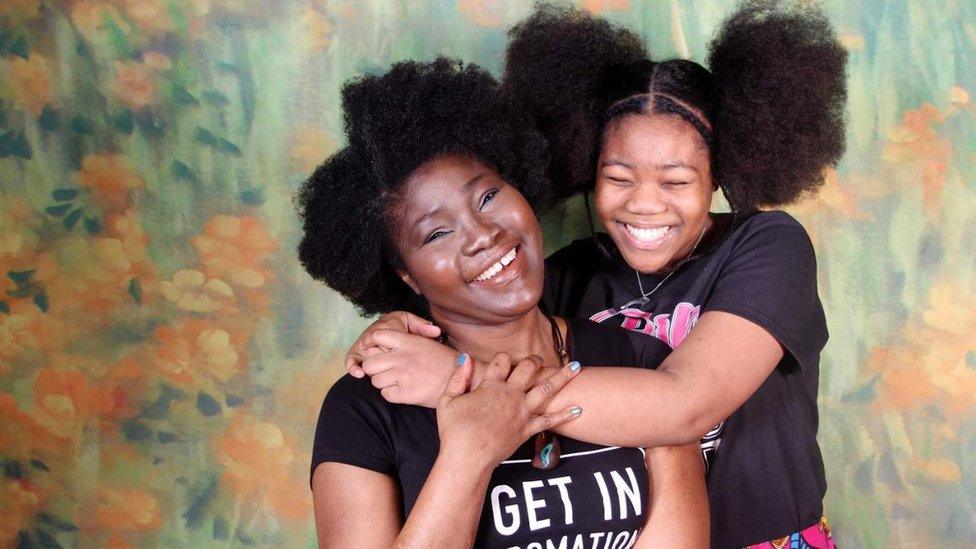
'My hair is a symbol of pride' - Six stories about black women's hair
Join the conversation - find us on Facebook, external, Instagram, external, YouTube, external and Twitter, external.
